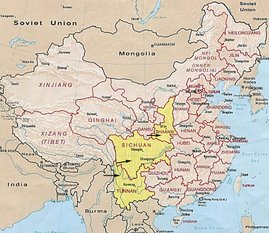Although about six million people live in the Zhanjiang area, this is a small city by Chinese standards. The north part of town, where Scott and I live, is called Mazhan. The Mazhan area is less developed than the central and southern districts, mainly because it's on the edge of the countryside. If you were to continue north about ten minutes outside of Mazhan, you would be driving past people working the fields and rice paddies. That's why Mazhan is made up of primarily farm parts shops and it's not uncommon to see farmers and oxen pulling carts down the street.
Continuing south, one will next come upon the central district of Zhanjiang, called Chikan. In my opinion, this is the best area... it's where the Zhanjiang Normal College is located, as well as small stores and the Wal-Mart owned shopping center called TrustMart (which Scott and I visit almost every day). Chikan is home to lots of great little restaurants, most of which are located in winding and narrow alleyways. It's just civilized enough to be relatively comfortable, but it lacks the pollution, noise and crowds found in bigger cities like Tianjin.
The southernmost area of Zhanjiang is known as Xia Shan. From our school in Mazhan to the end of the line in Xia Shan, it's about a 45-minute bus ride. Xia Shan is considered "the city" because it's the most developed section of Zhanjiang, with several large shopping malls, tallish buildings, and lots of honking and traffic. Xia Shan is closer to the sea than Mazhan and Chikan, and is home to several beautiful parks with excellent views of the water. The common opinion of Xia Shan amongst Zhanjiang-ites is that "It is more beautiful than Chikan." For me, however, Xia Shan is too loud, too crowded, and lacks the personality and interesting quirkiness of Chikan.
Last night, Madison invited us along with about ten other young teachers out for dinner. This was no small act of kindness: last night was the Mid-Autumn Festival and one of the most important family holidays of all Chinese festivals. During dinner, Madison told us that the headmaster had called him and "demanded" that he make us feel welcome on Mid-Autumn Day. So, the end of the story is that the bunch of us all went to an excellent Western-style dinner in a very upscale, new area of town: Madison really does a great job of taking care of Scott and I.
The restaurant was located on the way to Xia Shan in a trendy new neighborhood that's quickly becoming the hottest commodity in Zhanjiang. Here, affluent Chinese families stroll along avenues lined with palm trees, spacious stucco-sided apartments and sophisticated restaurants: all overlooking a lovely ocean-side park, which we walked through to view the moon after dinner.
The evening really got me thinking about the huge income gap apparent in many of the places in China I've visited, including Tianjin, Beijing, and Chengdu. So many cities in this country are sprouting neighborhoods like the one I visited last night, while just 20 minutes down the road people are still living in shacks as peasants. More and more Chinese are purchasing cars, which are still considered a luxury item here, while others still employ an ox-pulled cart as a mode of transportation. Our dinner party feasted on steak, French fries and red wine; just down the street, there were numerous families sitting on the street curb eating a tin of rice and fish.
There are several wealthy teachers at this school: Miss Wang has a brand-new car and carries a Louis Vuitton purse; David has a new Honda Accord, talks on a Bluetooth, and wears designer clothes; Madison owns a second home in the upscale neighborhood we visited last night. On the other hand, there are the teachers like Helen and Zhu who live in cramped, non-air conditioned apartments, teach twenty classes every week, and get paid about $250 per month.
I realize that the same problem exists in the United States, but in China the disparity is much more obvious, as evidenced by its strong effects even in an isolated place like Zhanjiang. Elderly Chinese lived in a completely different country than the one their grandchildren are growing up in today. As the standard of living rapidly increases, it is inevitable that some people will be left behind to continue life in the old way... but I wonder when these country people will realize the new opportunities that exist to challenge and better their current modes of existence.
Wednesday, September 26, 2007
The Haves and the Have-Nots
发表者
Janet
位置在:
4:53 AM
![]()
Subscribe to:
Post Comments (Atom)


No comments:
Post a Comment